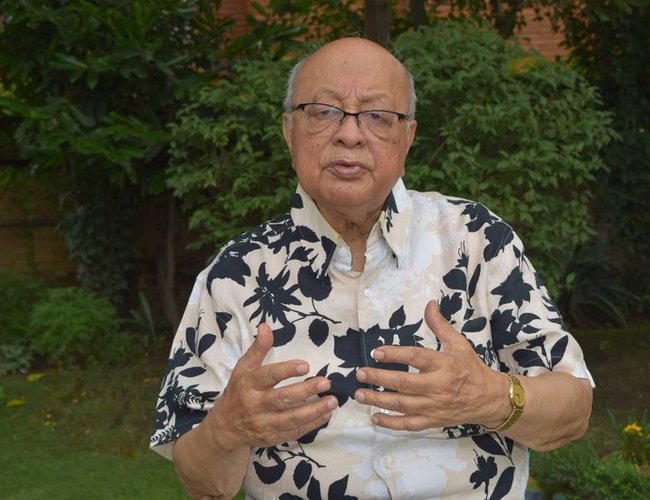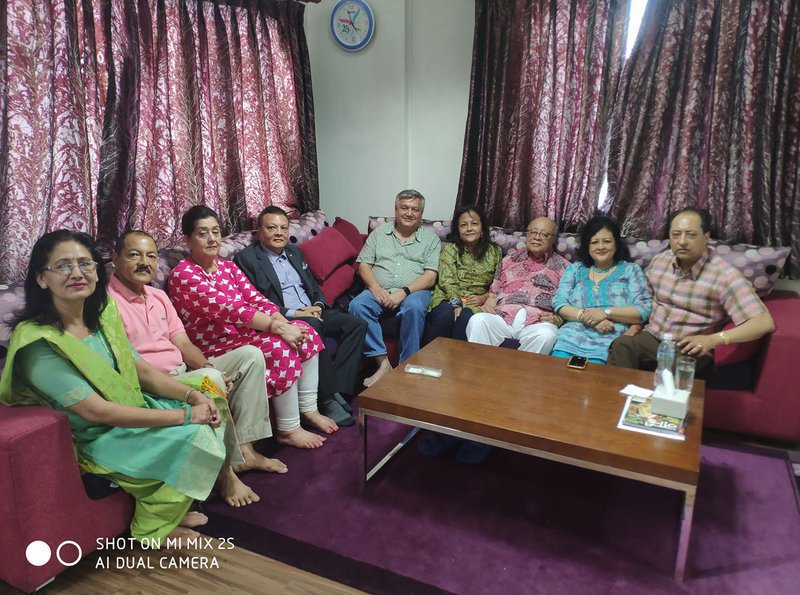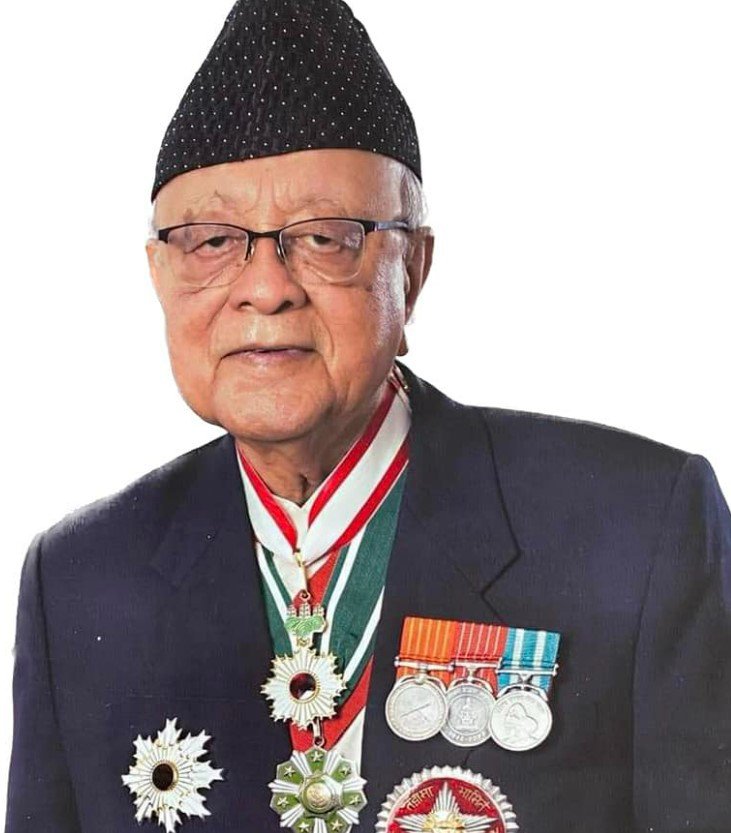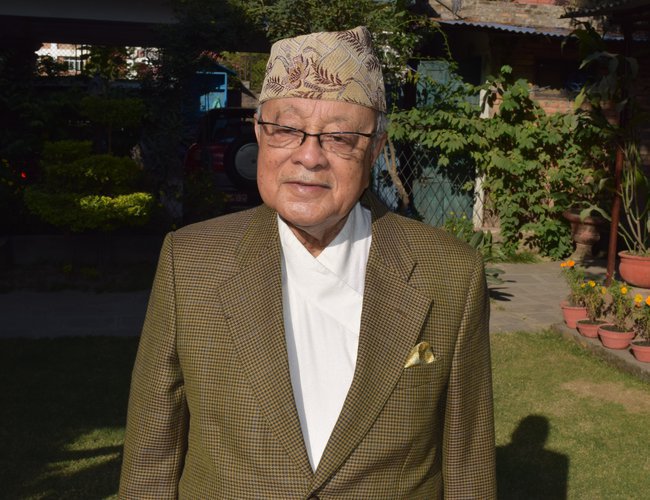
Birth and death are natural processes. However, out of billions of births, only a few are remembered forever. Similarly, some people are immortalized for their contributions. Although he died last year, the late Himalaya Sumsher Rana is still remembered for his contributions to the nation.
Despite having such a high profile, Rana was a simple and humble personality and always maintained his decency with all the people who came to meet him. Late Rana was popular among civil society leaders due to his humble attitude.

Rana with his family members (File Photo)
He was the first governor of Nepal Rastra Bank, credited with bringing Nepali currency into wider circulation within the country. He passed away on February 5, 203 at the age of 95, leaving a significant void.
His contributions to Nepal's financial sector are unparalleled, and no one can take his place in Nepali history. Nepal Rastra Bank (NRB) Governor Maha Prasad Adhikari remembered Rana as a prominent economist, economic thinker, and promoter of Nepal's financial sector. Adhikari expressed his condolences.
Rana established the base for monetary and banking infrastructure in Nepal by bringing the Nepali currency into circulation and determining the exchange rate for the Nepali currency with the Indian currency for the sustainable development of Nepal's banking system.
His loss will be unbearable as he was a guardian of Nepal Rastra. Rana served as Nepal's first central bank governor from April 26, 1956, to February 7, 1961.
He was born on January 8, 1928, in the liberal Rana family of Dev Sumsher Rana. After studying at Durbar High School, he post-graduated from Bombay University, India, and returned home to join the political revolution of 1950 against Rana Rule.

After a successful revolution, Rana joined the civil service. He later became the first governor of the central bank, having previously served as finance secretary under the leadership of then Finance Minister Subarna Shumsher Rana.
Rana served as the Secretary of Finance and is credited with modernizing customs administration, strengthening inland revenue administration, and establishing the Office of the Auditor General for financial transparency in public spending during their tenure.
Nepal's first commercial bank, Nepal Bank Limited, had already been established during the 1950s, but a central bank was still needed.
As a finance secretary, he drafted NRB's charter as an officer-on-special-duty. In its Golden Jubilee Publication, 'Nepal Rastra Bank in Fifty Years,' the central bank highlighted the key tasks Rana carried out as its first governor.
The foremost challenge at that time was to increase the circulation of Nepali currency throughout Nepal. The Nepalese currency was declared the only legal tender of the country with the promulgation of the Act to Increase Nepalese Currency Circulation in 1957.
The NRB issued its own currency notes for the first time on February 19, 1959 (Democracy Day), supplementing the Act. Four denominations, Re1, Rs5, Rs10, and Rs100, were issued.
At that time in the Nepali economy, Indian currency was widely circulated and its exchange rate with the Nepali currency was uncertain. This was another anomaly.
During Governor Rana's tenure, the stabilization of the exchange rate between the Nepali and Indian currency and the enactment of two Acts were significant milestones. They enhanced public confidence in the national currency and eliminated the dual currency period, according to the NRB.
During Rana's tenure as governor, foreign currency accounts were maintained with the central banks of India and England, as well as the commercial banks of the United States and Japan, to facilitate foreign exchange transactions.

Bhekh Bahadur Thapa, former Finance and Foreign Minister and former Central Bank Governor, remembers Rana as a figure who contributed to modernizing Nepal's economy.
Thapa, who served as the central bank governor from August 1966 to July 1967, said that Rana introduced modern banknotes in the country and helped modernize the Nepali economy.
After retiring from the central bank, Rana was affiliated with the United Nations, serving in various capacities in different countries.
Rana established Himalayan Bank in 1993 in a joint venture with Habib Bank Limited of Pakistan, and he was a pioneer in bringing foreign direct investment to Nepal. The bank became one of the top private sector banks in the country.
Rana partnered with Tuborg and Carlsberg, the Danish breweries, to establish the Gorkha Brewery Company and introduce international beer brands to Nepal.
In addition to his economic activities, he also played an active role in promoting peace and democracy in the country. During the decade-long conflict, Rana worked to bring the Maoist rebels into peaceful politics.
Over the past few years, Rana has chaired the General Election Observation Committee and monitored elections.
A Politically Liberal
Rana witnessed many political upheavals in Nepal and abroad during his 95-year-long life. He was the great-grandson of Dev Sumsher Rana, a liberal Prime Minister of Nepal. Rana himself was a liberal Rana.
After King Mahendra took political action in 1960, dissolving Nepal's first elected Parliament and jailing Prime Minister B P Koirala, Rana was sacked.
Rana joined the United Nations and served for four decades in Sri Lanka, Afghanistan, and Pakistan. He lived through political turmoil in those countries, all of which he recounts with personalized details in his memoir.
He was also awarded Japan's Order of the Rising Sun by the Japanese Ambassador to Nepal in May 2022 for his contribution to developing banking relations with Japan.
This was in recognition of Rastra Bank opening its first foreign account in the Bank of Japan in 1957. He was also an enthusiastic football player. He captained the New Road Team (NRT), which was active in mobilizing youths against the Rana regime.
In 2004, during the insurgency, he used his considerable diplomatic skills to try to broker a peace deal between the government and Maoist rebels.
None of his family members are currently in regular civil service. However, his sons, daughters, and grandsons have served the country in various capacities.
Pratima Pande, his elder daughter, has been involved in heritage conservation and the promotion of Nepal's legacy and identity. She has worked with institutions such as the Nepal Britain Society and served as Honorary Consul General of Italy. Similarly, Ashoke Sumsher Rana, his elder son, has served the country in the financial sector as the CEO of Himalayan Bank, a reputable bank in Nepal.
Sangeeta Thapa, another daughter, is a well-known figure in the global art scene for her efforts to promote Nepalese art. As the Director and Curator of Siddhartha Art Gallery, Thapa is responsible for branding Nepalese art worldwide. Amar Rana, the younger son, has also made contributions through his own work after working for almost a year at Nepal TV.
Rana was born into an aristocratic family and is the great-great-grandson of liberal Rana Prime Minister Dev Sumsher. He inherits many of his great-great-grandfather's character and legacy. Like his grandfather, who declared himself a servant of the people, he remains humble as an ordinary citizen.
Rana grew up in a liberal family environment and had no trouble adjusting to a new system even after 2007. Although most Ranas are given higher positions at birth, Himalaya Sumsher sided with the commoners in 2007 by signing a document in India demanding a liberal system in Nepal. The impact of education and liberal views can be seen throughout his career.
As the Chinese philosopher Confucius said, a society will be remembered forever for its contribution to the nation. Late Rana will also be remembered forever.

Keshab Poudel
Poudel is the editor of New Spotlight Magazine.
- KUL MAN GHISING: Bowing Down To The People
- Apr 13, 2025
- POLITICAL VIOLENCE: Culture of Impunity
- Apr 11, 2025
- PM OLI MEETS PM MODI: No Progress
- Apr 09, 2025
- PM OLI’S THAILAND VISIT: Flip Flop
- Apr 08, 2025
- FM Dr. Deuba’s India Visit: Mission Aborted
- Mar 26, 2025















